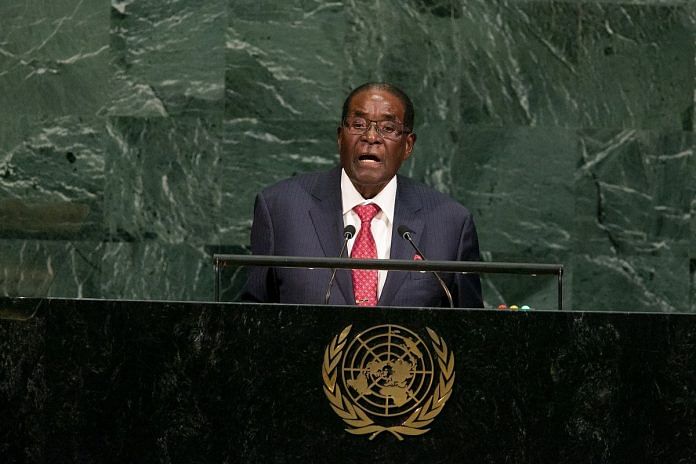While Yemen finds itself in the middle of a food crisis, in Zimbabwe a collective failure to act by world leaders has resulted in the present crisis.
A collective failure in Zimbabwe?
Mugabe’s deposition in Zimbabwe’s recent “coup” has not met with a reaction worthy of that of dictator’s ousting.
“The real mystery is why Western liberals and progressives so often fall for the Mugabes of the world, and why they seem to learn so little from successive and inevitable disenchantments,” writes Bret Stephens in the New York Times.
“When will they stop confusing national independence with individual freedom, liberation with liberty? In the case of Mugabe, it took some 20 years of misrule for Western governments to cut him off,” he writes.
“The world’s poorest countries deserve better than to be the petri dish for Western experts who know too little and a field of fantasy for Western progressives who dream too much.”
Starved for help
The situation in Yemen, which was described as critical for nearly two years, has worsened this months, writes Amanda Erickson. Almost 80 per cent of the country is food-insecure, with famine setting in after Saudi Arabia implemented a blockade on its borders with Yemen, drastically cutting out the supply of food, water, and medical supplies.
“How did one of the poorest countries in the world get to that point? It’s a complicated story, one that involves warring regional superpowers, terrorism, oil and an impending climate catastrophe,” she writes.
“Lots of people outside of Yemen are fighting for control and influence. And lots of the people within the country are paying the price.”
Yemen is also dealing with an environmental crisis, in addition to its political problems. Largely as a desert, Yemen is facing a scarcity of water, having one of the lowest rates of per-capita water availability in the world. Before the civil war, Yemen imported 90 per cent of its food, mostly by sea, and has seven million Yemeni people relying on imported food.
Prioritising nuclear health over medicines
A North Korean soldier who was shot multiple times while defecting to South Korea has also given an insight into the deplorable health of people living under Kim Jong-Un. A surgery revealed dozens of parasitic worms in his intestines, writes Choe Sang-Hun in the New York Times.
The discovery indicates poor hygiene and nutrition in North Korea, shocking to its prosperous neighbours in South Korea.
“The soldier’s condition was particularly noteworthy because North Korean soldiers, especially those deployed near the border with South Korea, receive priority in food rationing. Yet, in addition to the parasitic worms, doctors found kernels of corn in his stomach,” the article says.
The isolated North Korea is now reaching out to its ally Cuba to improve trade, and one can only hope that nutrition and healthcare finds a priority.
Venezuela’s on the brink
What’s happening in Venezuela demonstrates a situation that was hitherto unlikely: even oil rich countries can go broke.
“For several years Venezuela’s self-styled socialist government has been paying billions of dollars to Wall Street to avoid default on its staggering debts, even while starving its people of vital imports of food and medicine. Now that unlikely policy, one of the last ways in which the government of Nicolás Maduro distinguished itself from the world’s pariah regimes, appears to be crumbling,” says an editorial in the Washington Post.
“Last week, ratings agencies declared Venezuela and its state oil company to be in selective default. With just $10 billion left in its reserves, it looks unlikely to cover the more than $8 billion it owes in the next year.”
What this means is that full default is likely over the next few months.
“The regime’s reluctance to default reflects a healthy fear of the possible consequences. Venezuela has substantial assets abroad, including the oil company Citgo and the refineries it operates in the United States. If these, along with Venezuela’s tankers, are seized, the government could lose its last economic lifeline,” the editorial says.
Italy’s next central leader
Italy might have a new strong leader in the form of Luigi Di Maio, writes Ishaan Tharoor in the Washington Post. A millennial described as a “former waiter”, he gained national attention through his activism for the Five Star Movement, a protest organization founded less than a decade ago.
“In this vein, it is not dissimilar to other anti-establishment uprisings in Europe,” writes Tharoor. “But the ideology of the Five Star Movement is remarkably difficult to pin down. The party advocates social and environmental justice, is skeptical of big corporations and uninterested in — though not totally opposed to — Italy’s commitment to a military alliance such as NATO. Yet it also is animated by a kind of libertarianism that is hostile to government and eager to loosen up the financial system.”
Could Di Maio’s amorphous ideological style wrest power from the right-wing Berlusconi in Italy?
“Berlusconi may ultimately be Di Maio’s major obstacle to power,” writes Tharoor, but Di Maio takes his coming second in a conservative part of Italy as a “good omen”.



